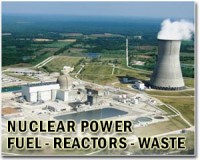 |
Berlin (AFP) March 15, 2011 Growing alarm over Japan's nuclear disaster prompted several European nations to review the safety of their own nuclear installations Tuesday, with Germany temporarily shutting down seven reactors. As Japan's nuclear crisis raged on Tuesday with two more blasts and a fire rocking the quake-stricken Fukushima power plant, Chancellor Angela Merkel announced a safety review of Germany's 17 nuclear reactors and a three-month closure of seven of them. "We are launching a safety review of all nuclear reactors ... with all reactors in operation since the end of 1980 set to be idled for the period of the (three-month) moratorium," Merkel said. In Brussels, the European Union, responding to soaring public anxiety, agreed Tuesday to conduct "stress tests" on the continent's nuclear power plants, the bloc's energy chief Guenther Oettinger said. Oettinger said the tests would be conducted on a "voluntary" basis and would look at whether plants could resist earthquakes, tsunamis and terrorist attacks. The agreement was reached at a meeting of ministers, national nuclear safety chiefs and industry leaders hastily called by Oettinger. In Moscow, Prime Minister Vladimir Putin ordered a review of the future of Russia's atomic energy sector in the wake of the earthquake and tsunami that devastated Japan. He said that Russia did not have atomic power stations built on earthquake fautlines and had no plans to build them there. "We need to be prepared to act in any eventuality," he added. Putin's remarks mark the first time the Russian leadership has questioned the future of nuclear energy in Russia after the Japanese earthquake, which damaged the Fukushima nuclear power plant. Russia is one of the world's most significant producers of nuclear energy and it also builds nuclear power stations abroad. In Britain, the government asked its chief nuclear inspector to report on what implications the Japanese nuclear crisis could have for the country's nuclear energy sector. France's Foreign Minister Alain Juppe, speaking Tuesday after a Paris gathering of G8 powers, highlighted the gravity of Japan's nuclear emergency. "The situation is extremely serious... The risk is extremely high," said Juppe, after Japan's Takeaki Matsumoto briefed him and their other G8 counterparts on the situation. Amid heightened public concerns over France's own big nuclear power sector, Environment Minister Nathalie Kosciusko-Morizet announced safety checks on all the country's 58 nuclear power reactors. But French Prime Minister Francois Fillon insisted it would be absurd to condemn nuclear energy out of hand. France is proportionally the world's biggest user of nuclear power, with 58 reactors in 19 power plants providing around 75 percent of its energy needs. Japan's nuclear emergency also prompted Switzerland Monday to suspend plans to replace its ageing nuclear power plants, with Italy taking a hard look at its new nuclear energy plans while Poland said it would press on with building it first plants. In Sweden, an official at the Radiation Safety Authority stressed that work to modernise the country's 10 reactors at three power stations was ongoing. And Bulgaria said there was no plan to shut down the two operational 1,000-megawatt reactors at its single nuclear power plant at Kozloduy on the Danube, prior to their operation deadlines which expire in 2017 and 2019. In Spain, the environmental umbrella group Ecologists in Action urged the government Tuesday to close the country's oldest nuclear reactor following the Japanese developments. Twenty European Union states have offered to assist rescue efforts in Japan and the bloc is also ready to help contain its nuclear disaster, European Union president Herman Van Rompuy said Tuesday. "As things stand now, 20 member states have offered personnel or material to the so-called European civil protection mechanism" that would coordinate aid to Japan, Van Rompuy said at a joint press conference with Polish Prime Minister Donald Tusk in Warsaw. "We are also ready to assist in the case the situation in the nuclear power plants deteriorates further," he said, but provided no further details. Primary assistance would include field hospitals, water purification units, and search and rescue expertise, Van Rompuy said. burs/sj/mm
Share This Article With Planet Earth
Related Links Nuclear Power News - Nuclear Science, Nuclear Technology Powering The World in the 21st Century at Energy-Daily.com
 Fresh fire at Japan nuclear reactor: operator
Fresh fire at Japan nuclear reactor: operatorTokyo (AFP) March 16, 2011 A fresh fire broke out at a reactor of Japan's quake-hit Fukushima No. 1 nuclear power plant early Wednesday, operator Tokyo Electric Power (TEPCO) said. An employee confirmed smoke was pouring from the roof of the number-four reactor at the plant, a TEPCO spokesman told reporters. "We immediately informed local authorities and the fire department about it," the spokesman said. "We are b ... read more |
|
| The content herein, unless otherwise known to be public domain, are Copyright 1995-2010 - SpaceDaily. AFP and UPI Wire Stories are copyright Agence France-Presse and United Press International. ESA Portal Reports are copyright European Space Agency. All NASA sourced material is public domain. Additional copyrights may apply in whole or part to other bona fide parties. Advertising does not imply endorsement,agreement or approval of any opinions, statements or information provided by SpaceDaily on any Web page published or hosted by SpaceDaily. Privacy Statement |